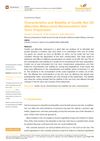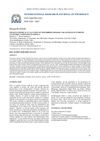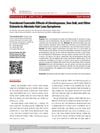 1 citations,
January 2024 in “Journal of applied pharmaceutical science”
1 citations,
January 2024 in “Journal of applied pharmaceutical science” Bacteria from Xylocarpus fruit can be used in hair creams to treat hair loss and fight infections.
 October 2024 in “Current Trends in Biotechnology and Pharmacy”
October 2024 in “Current Trends in Biotechnology and Pharmacy” The shampoo effectively promotes hair growth and is halal-compliant.

Neem leaf extract combined with eucalyptus and lemongrass oils can effectively treat Tinea capitis.
 March 2024 in “Asian journal of beauty & cosmetology”
March 2024 in “Asian journal of beauty & cosmetology” Derma Genie™-H001 can help prevent hair loss and promote hair growth.

Ayurvedic herbs may reduce side effects and improve effectiveness of cancer treatments.
 February 2024 in “Trends in Sciences”
February 2024 in “Trends in Sciences” Store Tectona grandis leaf extracts in slightly acidic, light-protected conditions for best stability.
 September 2022 in “KnE medicine”
September 2022 in “KnE medicine” Higher candle nut oil concentration increases droplet size and changes the hair tonic's properties and stability.
 July 2022 in “Journal of bio innovation”
July 2022 in “Journal of bio innovation” Panchakarma detoxifies the body, balances doshas, and is more effective than modern medicine alone for toxin removal and cell rejuvenation.

False daisy is a medicinal herb with many health benefits, including hair growth promotion.
 December 2021 in “International research journal of pharmacy”
December 2021 in “International research journal of pharmacy” The quality of Neelibhringadi Keratailam varies among products, suggesting a need for better standardization and quality control.
 January 2012 in “Human health handbooks”
January 2012 in “Human health handbooks” Traditional Indian remedies are used for hair health, but more scientific evidence is needed to prove their safety and effectiveness.
 March 2023 in “International Journal of Advanced Research in Science, Communication and Technology”
March 2023 in “International Journal of Advanced Research in Science, Communication and Technology” Various medicinal plants like Polygonum multiflorum, Red ginseng extract, and Zizyphus jujuba can potentially treat hair loss, offering benefits like low cost and multiple ways of working. Other effective natural substances include Pygeum africanum, Seneroa, Urtica dioica, and more.
 March 2021 in “Dermatological reviews”
March 2021 in “Dermatological reviews” Hair transplant works well, but needs more research for better results.
 260 citations,
January 2019 in “Pharmaceutics”
260 citations,
January 2019 in “Pharmaceutics” Niosomes are a promising, stable, and cost-effective drug delivery system with potential for improved targeting and safety.
 136 citations,
May 2016 in “Phytotherapy Research”
136 citations,
May 2016 in “Phytotherapy Research” Turmeric may have benefits for skin health, but more research is needed to confirm its effectiveness.
 94 citations,
September 2014 in “Therapeutic Delivery”
94 citations,
September 2014 in “Therapeutic Delivery” Nanoparticles can improve skin treatments by better targeting hair follicles, but more research is needed for advancement.
 76 citations,
August 2018 in “International Journal of Cosmetic Science”
76 citations,
August 2018 in “International Journal of Cosmetic Science” Dermal Papilla cells are a promising tool for evaluating hair growth treatments.
 75 citations,
January 2014 in “Archiv Der Pharmazie”
75 citations,
January 2014 in “Archiv Der Pharmazie” Jasmonic acid and its derivatives play important roles in plant health and have potential uses in medicine and agriculture.
 39 citations,
July 2016 in “Biomedicine & Pharmacotherapy”
39 citations,
July 2016 in “Biomedicine & Pharmacotherapy” Cedrol from Platycladus orientalis leaves may promote hair growth effectively, especially in female mice.
 17 citations,
April 2021 in “Molecules/Molecules online/Molecules annual”
17 citations,
April 2021 in “Molecules/Molecules online/Molecules annual” Linoleic acid from Malva verticillata seeds may help treat hair loss by promoting hair cell growth and blocking baldness signals.
 13 citations,
October 2017 in “Bioscience, Biotechnology, and Biochemistry”
13 citations,
October 2017 in “Bioscience, Biotechnology, and Biochemistry” Centella asiatica extract may help promote hair growth by blocking a specific cell signaling pathway.
 10 citations,
May 2018 in “Nutrition and Cancer”
10 citations,
May 2018 in “Nutrition and Cancer” Certain spices may help prevent and treat skin cancer, but more human trials are needed.
 9 citations,
January 1966 in “Economic botany”
9 citations,
January 1966 in “Economic botany” Plant-based ingredients in hair care are being replaced by synthetic alternatives.
 6 citations,
February 2018 in “PLOS ONE”
6 citations,
February 2018 in “PLOS ONE” Insect wax, especially its policosanol content, may help hair regrow by changing hair follicle phases and increasing nutrient supply.
 5 citations,
February 2011 in “Expert Opinion on Drug Discovery”
5 citations,
February 2011 in “Expert Opinion on Drug Discovery” We need better treatments for hair loss, and while test-tube methods are helpful, they can't fully replace animal tests for evaluating new hair growth treatments.
 4 citations,
March 2021 in “Asian Journal of Beauty and Cosmetology”
4 citations,
March 2021 in “Asian Journal of Beauty and Cosmetology” Dendropanax, sea salt, and other extracts can help reduce hair loss and promote hair growth.
 3 citations,
July 2016 in “Atlas of the Oral and Maxillofacial Surgery Clinics”
3 citations,
July 2016 in “Atlas of the Oral and Maxillofacial Surgery Clinics” Careful planning and technique in upper facial rejuvenation can minimize risks like hair loss, nerve damage, and scarring.
 3 citations,
June 2010 in “Pharmacognosy journal”
3 citations,
June 2010 in “Pharmacognosy journal” The polyherbal hair oil effectively reduces dandruff and promotes hair growth.
 2 citations,
May 2021 in “Journal of pharmaceutical and biomedical analysis”
2 citations,
May 2021 in “Journal of pharmaceutical and biomedical analysis” A new method was developed to accurately detect and measure 47 different drug ingredients in various products.
 2 citations,
August 2019 in “BMC Complementary and Alternative Medicine”
2 citations,
August 2019 in “BMC Complementary and Alternative Medicine” Asiasari radix extract may be a potential treatment for melanoma because it selectively triggers cell death in melanoma cells by affecting p53 regulation.






























